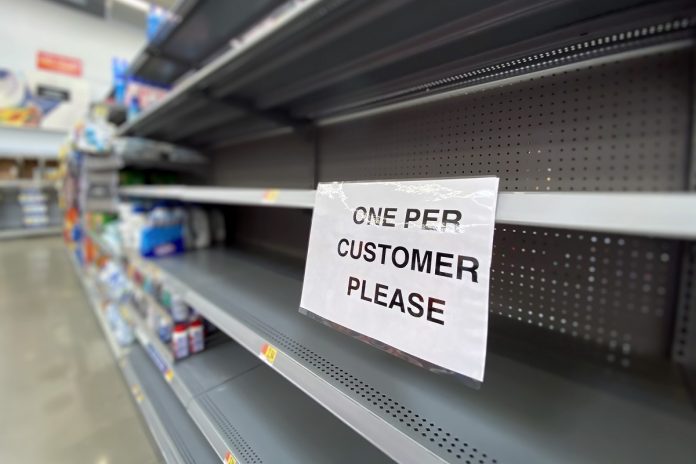
By now, you probably have experienced the long lines and empty shelves at grocery and warehouse stores. Or you may have tried to buy staples such as canned food and toilet paper online from companies such as Walmart, Target, and Amazon only to discover they are sold out.
This seems unprecedented, but a look back at our history helps explain the phenomenon.
Sander van der Linden, an assistant professor of social psychology at Cambridge University, said a “fear contagion” phenomenon has taken hold in America. “When people are stressed their reason is hampered, so they look at what other people are doing,” he said. “If others are stockpiling, it leads you to engage in the same behavior. People see photos of empty shelves and regardless of whether it’s rational, it sends a signal to them that it’s the thing to do.”
As humankind has become more civilized and technological advancements have changed our lives, the survival instinct can become dormant. However, as current events clearly indicate, this survival behavior quickly can be reignited and spread like wildfire.
A look back to the Great Depression can cast some light on human behavior during a crisis.
John Montgomery Ph.D., wrote about this human condition. “When we live in environments, such as modern cities, that are drastically different from the environments that we’re biologically adapted for, we become subject to various ‘evolutionary mismatch’ effects that can be extremely detrimental to our physical and emotional health,” he wrote. “Perhaps the most important consequence of this mismatch is that we become highly prone to being triggered repeatedly and unnecessarily into various states of survival mode.”
A look back to the Great Depression can cast some light on human behavior during a crisis. As conditions worsened over the course of the Depression and people increasingly lost confidence in banks, they started withdrawing their money in large numbers. Recognizing the crisis, in 1932 President Herbert Hoover denounced “traitorous hoarding” and organized an anti-hoarding drive. He also delivered a radio address pleading for people to stop hoarding and cease converting bank deposits into cash. Few listened.
Why policy and leadership matter
In the aftermath of the Great Depression, many argued the financial sector was so important it needed to be closely monitored and regulated. For a while it was. But then Republican administrations continued to wind back many of the regulations that kept financial institutions from gorging themselves to death. The lack of oversight ultimately led to the Great Recession of 2007 – 2009.
After then-President George W. Bush left office, President Barack Obama implemented new regulations aimed at keeping the banking system healthy. However, those safeguards again were rolled back once Donald J. Trump took office.
Early in his administration, as if a “thank you” to Wall Street, Trump signed a directive aimed at dismantling the Dodd-Frank Wall Street Reform and Consumer Protection Act, crafted by the Obama administration in response to the 2008 economic meltdown. Trump also signed a memorandum to reverse the “fiduciary rule,” which requires brokers to act in their clients’ best interest, rather than seek the highest profits for themselves, when providing financial planning advice.
Trump’s action on the fiduciary rule, which Democrats and consumer groups immediately denounced, allows financial advisors to steer unsuspecting clients toward investments that may enrich the broker but not be in the client’s best interest.
The great disconnect from the facts
The premise that the Republican party is the party of fiscal conservatives and the Democrats are fiscal numbskulls just doesn’t fit with the facts. In fact, during the past thirty-nine years, all the United States’ recessions occurred under Republican administrations.
• The Great Recession, set off by a subprime mortgage crisis, began in December 2007 under President George W. Bush.
• The early 2000s recession, sparked by the dot-com market crash, began in March 2000 under President George W. Bush.
• The early 1990s recession, precipitated by a savings-and-loan crisis, began in July 1990 under President George H.W. Bush.
• The 1981 recession, which found its genesis in an energy crisis and “stagflation,” began in July 1981 under President Ronald Reagan.
Moreover, America’s deficit spending, once anathema to Republicans, has increased more under recent Republican administrations than under Democratic presidencies.
Reagan took the federal deficit from $70 billion to $175 billion. George H.W. Bush took it to $290 billion. President Bill Clinton reduced it to zero. George W. Bush took it from zero to $1.4 trillion. Obama halved it to $584 billion. The Trump administration has raised it back to more than $1 trillion.
The U.S. is now in another crisis. The health of the country’s citizens and economy is under attack. People are hoarding supplies, and a survivalist mentality has infected the populace.
In this election year, voters can decide whether we have thoughtful, intelligent, compassionate leaders in Washington or boisterous, dishonest fools on the hill. The choice may be at the very heart of our survival.
 Randall Huft is president and creative director at Innovation Agency, an advertising, branding, and public relations firm specializing in the cannabis industry. While working with blue-chip companies including AT&T, United Airlines, IBM, Walgreens, American Express, Toyota, and Disney, he discovered what works, what doesn’t, and how to gain market share.
Randall Huft is president and creative director at Innovation Agency, an advertising, branding, and public relations firm specializing in the cannabis industry. While working with blue-chip companies including AT&T, United Airlines, IBM, Walgreens, American Express, Toyota, and Disney, he discovered what works, what doesn’t, and how to gain market share.










